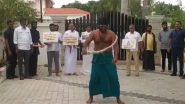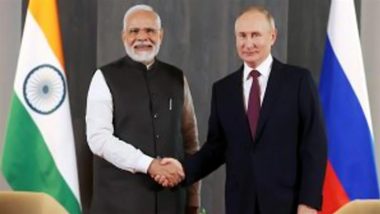Moscow, Nov 16 (AFP) Russia's FSB security service had a mole in a company used by Britain and other countries to process visa applications, according to a report published Friday by investigative group Bellingcat.
The report suggested this was part of a wider strategy that allowed agents such as those who allegedly poisoned ex-spy Sergei Skripal in England to travel to the West under false identities.
The investigation quotes a man named as Vadim who says he worked as an IT specialist for TLSContact, which countries including Britain use to process applications for entry.
Vadim was recruited by the FSB after being transferred back to Moscow in 2015 from TLSContact's offices in Beijing, according to the investigation produced by Britain-based Bellingcat in collaboration with Russian site The Insider.
Russian authorities created a bureaucratic nightmare for him when he tried to secure residence for his Mongolian wife and foreign-born daughter.
An agent for the FSB said these problems would go away if he worked with the security services and Vadim began to provide them with information.
He was asked in 2016 to see about organising visas without reviews or background checks, but told the FSB it was impossible without an insider at the embassy itself.
Later that year he fled Russia and applied for asylum in the United States, according to the report.
The press office for the British embassy in Moscow told AFP the processing centre's work was purely administrative.
The centre was "not at all involved in the decision-making process" of whether to grant visas, a spokesman said. Bellingcat has previously published what it says are the real identities of both of Britain's suspects in the poisoning of Skripal and his daughter in the British city of Salisbury in March.
It identified the men as serving in Russia's GRU military intelligence service and gave their real names as Alexander Mishkin and Anatoly Chepiga.
The two appeared for an interview on Russian state television after President Vladimir Putin insisted they had not done anything criminal.
They gave the names on passports used for the trip -- Alexander Petrov and Ruslan Boshirov -- and said they were sports supplement salesmen who were sightseeing in Salisbury.
Bellingcat said its new investigation did not prove Russian spies had successfully infiltrated visa systems of Western countries.
But "it does paint a picture of a strategic, long-term Russian effort to compromise the visa issuance system, as well as to gather intelligence on potential travellers' plans".
The Kremlin has furiously denied any accusation of involvement in the Salisbury poisoning and Moscow officials have accused Bellingcat of "pumping out disinformation".(AFP) KUN
(This is an unedited and auto-generated story from Syndicated News feed, LatestLY Staff may not have modified or edited the content body)













 Quickly
Quickly





















